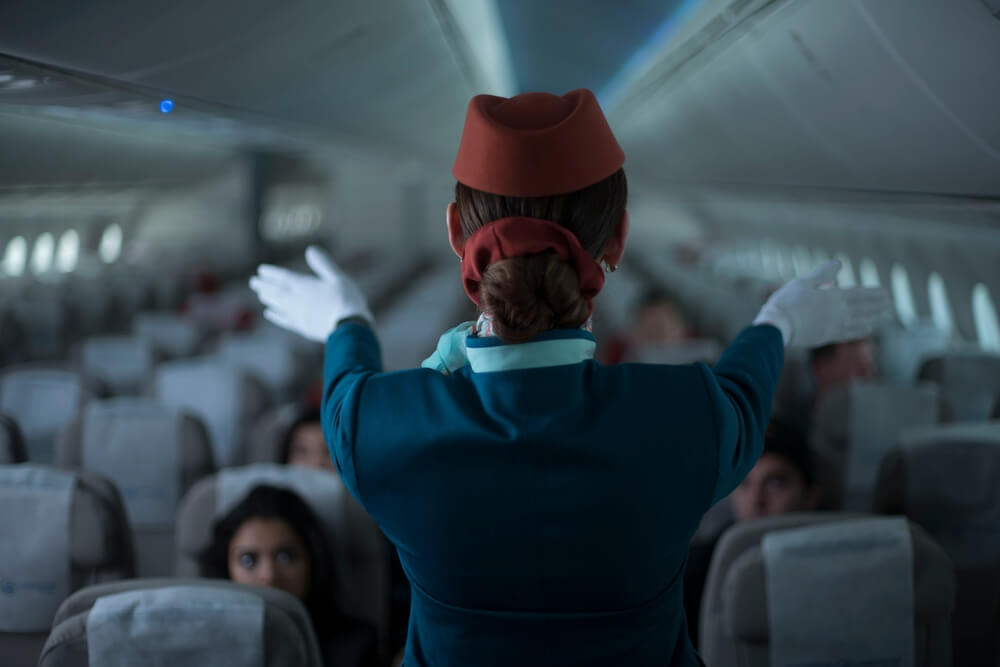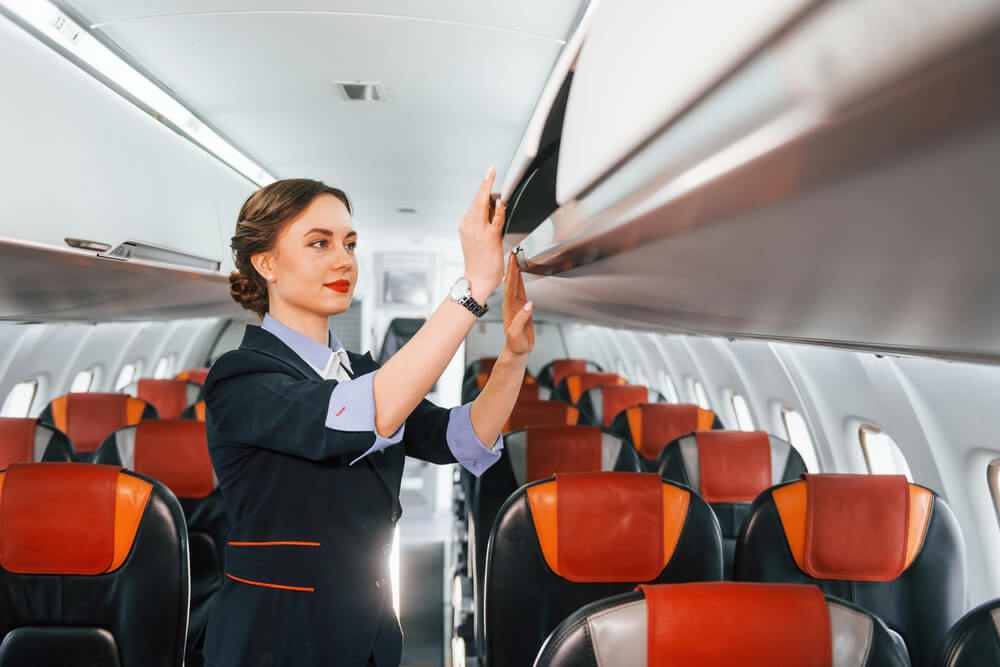What are Air Cabin Crew?
Air cabin crew members are expected to deliver an excellent level of customer service while they are flying to their destination. The comfort and safety of passengers will be your number one priority. You will have to serve refreshments and food and sell duty-free items.
Before flying you will need to do safety and security training to prepare yourself for emergency situations, this will include first aid. When you board the plane, you will also be responsible for making sure all the correct equipment is on the plane as well as enough supplies. You will then have to give a safety demonstration to ensure all passengers are aware of the safety protocols before taking off.
Responsibilities
- Welcome and assist passengers as they board and disembark the plane
- Escort passengers to their seats and provide additional attention to those who require it, such as elderly or disabled passengers
- Serve meals and drinks to passengers
- Inspect and ensure the proper condition of emergency equipment and provide relevant safety information to passengers
- Demonstrate the use of emergency equipment and explain safety procedures
- Administer first aid to passengers as needed
- Handle emergency situations with composure and quick thinking
- Provide passengers with in-flight entertainment, newspapers, and magazines
- Promote duty-free items and meet sales targets
- Prepare written flight reports after each journey.
Salary
This should only be used as a guide and different airlines will offer different forms of compensation - some offer a bonus if you speak a different language.
Most airlines also provide their cabin crew with a flight discount, which can consist of complimentary domestic flights, reduced fares for international flights, and discounted travel for their immediate family members. However, the extent of these discounts will vary. According to Glassdoor, the average national salary for air cabin crew is £45,707.
- Basic annual salaries can vary depending on the airline, but this will range from £12,000 to £14,000.
- However, once you gain some experience your basic salary will increase from around £15,000 to £19,000.
- Senior members of cabin staff will earn a higher basic rate of up to £23,000
- You will also be eligible for an hourly flight rate on top of your base salary while you’re on duty as well as a subsistence allowance for when you’re flying.
- Bonuses and commissions for inflight retail might also be offered. If you take these additional sums of money into the account, your income can increase up to £28,000 a year.
Working hours
Cabin crew work shifts, which will often include irregular and unsocial hours. This will involve early mornings, late nights, weekends and public holidays. However, hours will vary depending on the airline and whether you work for long or short-haul flights. Flexible hours are possible, but you may also have to be prepared to work on your days off if your return flight is cancelled or delayed.
What to expect
On average, flight attendants can anticipate spending between 65 to 90 hours in-flight, in addition to 50 hours dedicated to tasks such as preparing the aircraft, assisting with passenger boarding, and completing post-flight procedures. A typical schedule for flight attendants consists of working 12 to 14 days per month and logging between 65 to 85 flight hours, exclusive of overtime.

Qualifications
You don’t need a degree, HND/foundation degree, or postgraduate qualification to become a cabin crew member. Instead, most airlines expect candidates to have a solid secondary education, with some requiring a grade 4 (C) or higher in English and maths. While not mandatory, having a degree, HND, or foundation degree in the following subjects can demonstrate to airlines that you have a relevant interest:
- Travel
- Hospitality management
- Languages
- Tourism
Skills
- Empathy and supportive nature towards colleagues
- Effective teamwork and collaboration skills
- Strong communication skills
- Tactful and diplomatic approach with passengers while also being assertive when required
- Excellent customer service abilities
- Confidence in interacting with diverse individuals
- Quick and calm approach in defusing tense situations.
- Efficient and quick work pace while adhering to tight schedules
- Professional discretion when working with VIPs
- Ability to handle challenging situations and remain composed during emergencies
- Sales skills and business acumen
- Willingness to work flexible and irregular hours, including holidays
Work experience
You may be requested to show relevant work experience instead of qualifications as they will be more interested in your skill set.
Previous employment in any customer-facing roles, such as sales, will show you have transferable skills. Roles, where you are able to demonstrate you have good teamwork and communication skills, will be important.
Employers
Airlines can operate either on a chartered or scheduled basis, while some airlines operate a combination of both. Chartered flights are typically seasonal and operate during the summer or ski seasons to popular tourist destinations. Scheduled flights, on the other hand, operate throughout the year to various destinations on a regular basis. Employers will include both large and medium-sized airlines and international carriers. Check the airport’s website for specific airline information. It may be possible to find temporary seasonal opportunities directly through airlines and tour operators to cover the summer period. There is high competition for permanent contracts, to even be considered for one you will need to have several years of seasonal work experience.
You will be eligible for on-the-job training directly through the airline if you are new to the industry – these typically last between four and seven weeks. The most important training sessions will cover passenger safety, aircraft safety equipment, emergency procedures, security and first aid. However, you may also be required to do training and tests in areas such as:
- Assertiveness
- Cultural awareness
- Currency exchange
- Customs and immigration regulations
- Food preparation and service
- Galley management
- Passenger care and customer relations
- Personal grooming
- Product knowledge.
After completing your training you will then be put on a 6-month probationary period, where you will need to continue with certain elements of your training. After 6 months, you will have a review session where your performance will be assessed. If you pass this, you will then become a fully-fledged member of the cabin crew team.
Career prospects
Your career progression will purely be based on your experience and performance. From the role of a cabin crew member, it’s possible to progress to the position of purser or chief purser – which is the title given to the chief flight attendant. While having similar responsibilities to general cabin crew, pursers will also have managerial responsibilities, such as looking after passengers in first or business class. From here, you can work your way up to supervisor or cabin service director positions – in these positions you will be responsible for the cabin crew on board.
Related Courses
The BA Business course at UWS offers a broad-based and comprehensive understanding of business, from theory and strategy to operational issues.
Key elements of the course include talks from, and visits to, local and national employers and varied assessment formats, including case studies and portfolio building. Many of the course core module skills are in line with the requirements for graduate trainee programmes, helping you to prepare for a career in national and international organisations.
Other related courses
- MSc Business Management
- MSc Marketing and Communications Management
- MSc Innovation Management and Entrepreneurship





